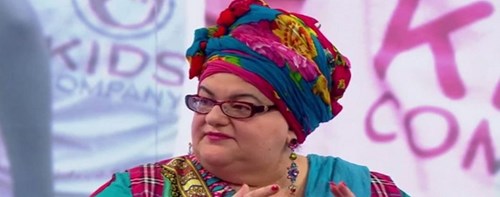There was only one interview we could focus on in today’s media training blog.
It was a heated exchange which saw the spokesperson accuse the reporter of ‘not asking the questions that really matter’ and of being ‘immensely biased’
This tense and sometimes fiery encounter happened yesterday when Camila Batmanghelijh appeared on the Victoria Derbyshire programme.
The founder of the now-defunct Kids Company charity was on the programme to give her views on the reasons for its closure (You can watch it by clicking on the image below at 1hr7:19).
It was an interview which saw her blame everyone else for the organisation’s collapse while repeatedly refusing to accept any responsibility for its closure.
If that was not attention grabbing enough on its own, Ms Batmanghelijh's manner in the interview made it truly memorable for the wrong reasons.
Appearing irritable from the start – constantly telling Ms Derbyshire to be ‘very careful’ about how she ‘framed’ certain questions – she was unable to hide her frustration at the direction the interview was taking.
Questions about specific examples of money potentially being misused were dismissed as ‘minor details' and a question about whether she would be able to recognise a stoned teenager was described as ‘patronising’. As her frustration grew Ms Batmanghelijh increasingly tried to tell the presenter what she should be asking.
Here’s one example:
Batmanghelijh: “You’re not asking me the questions that really matter, which is why was Kids Company left with some 17,000 children who were statutory responsibility with no one willing to pay for it. Why were we getting that type of child through our doors? Those are the sort of questions you should be asking me.
Derbyshire: “No, those are the sort of questions you want me to ask.”
If that was not awkward enough, worse was to follow as Ms Batmanghelijh went on to accuse Ms Derbyshire of being biased:
Batmanghelijh “I’m telling you that the manner in which you are asking your questions is immensely biased and they are framed in the context of these kids being individuals who are somehow flawed, who are not going to use the money properly and are going to go and have drugs.
Derbyshire: “That’s a gross generalisation and inaccuracy.”
ICYM: an interview with Camila Batmanghelidjh where she told me ‘the right questions’ weren’t being asked https://t.co/OvOgaZCDin
— Victoria Derbyshire (@vicderbyshire) October 19, 2017
One of the key media training lessons other media spokespeople can take from this extraordinary interview is the importance of not getting rattled or showing anger and frustration at the questions they are asked. The audience is more likely to be sympathetic if you remain calm and composed.
Getting into an argument with the journalist will not help you fight your corner and will take focus away from the messages you want to get across.
Batmanghelidjh is extraordinary. She refuses to accept any criticism or responsibility for anything
— Joel Taylor (@JoelTaylorhack) October 19, 2017
Her attempts at bullying Victoria Derbyshire and managing the interview are also very insightful...
— Neil Cowan (@_neilcowan) October 19, 2017
Camila Batmanghelidjh is having a car crash interview on Victoria Derbyshire right now. It’s great.
— Thackary Benx (@velzzb) October 19, 2017
Telling a journalist what to ask is also something which must be avoided. It is effectively telling them how to do their job and appears arrogant. There are much more subtle media training techniques which can be used during an interview to gain control, such as signposting and bridging, to make it clear to the reporter what they ask next.
The other really noticeable thing about this interview is that when Ms Batmanghelijh felt under pressure she responded by asking the reporter questions. This is a flawed tactic. The journalist is not going to get drawn because it is their job to ask questions rather than answer them and it shows the spokesperson is becoming increasingly desperate.
And finally, you have to question how prepared Ms Batmanghelijh was for this interview. She seemed woefully ill-prepared for facing challenging questions despite the controversy surrounding the charity and the way she constantly tried to tell the reporter what to ask suggests she simply did not know how to handle them.
Media First are media and communications training specialists with over 30 years of experience. We have a team of trainers, each with decades of experience working as journalists, presenters, communications coaches and media trainers.
Subscribe here to be among the first to receive our blogs.



